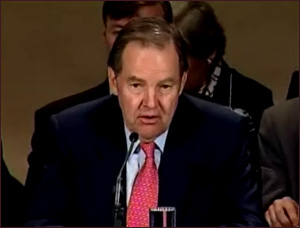The Response on the Ground
part 1 2 3 4
 | | Thomas Kean, Chairman, 9/11 Commission. From government video of 9/11 commission hearings. |
In July of 2004, Chairman Thomas Kean presented the 9/11 Commission's final report.
"The government failed to protect the American people," Kean said. "The United States government was simply not active enough in combating the terrorist threat before 9/11."
The report was exhaustive: 567 pages long, with 116 pages of footnotes - and it was unanimous. The five democrats and five republicans agreed on what went wrong, and what must be done.
"Every expert with whom we spoke told us that an attack of even greater magnitude is now possible, and even probable," Kean said. "We do not have the luxury of time. We must prepare and we must act."
The report essentially rewrote the story of 9/11. It says that after 9/11, terrorists were portrayed as "being all over the world, adaptable, resilient … and capable of anything." But the report says that image lets the government off the hook. It makes it seem as though nothing can be done to stop the next terrorist attack.
In reality, the September 11th plotters did make mistakes, and Kean said the government's counter-terrorism efforts failed to capitalize on those errors.
"Since the plotters were flexible and resourceful, we cannot know whether any single step or series of steps would have defeated them," he said. "What we can say with confidence is that none of the measures adopted by the U.S. government before 9/11 disturbed or even delayed the progress of the al Qaeda plot."
If border officials had better information about who was a threat, perhaps more of the 9/11 hijackers could have been prevented from entering the country.
If the airlines and the military had been prepared for an attack from inside the country, perhaps the hijackers could have been defeated
If rescue workers had communicated better in New York, perhaps fewer people would have died.
The commission recommends better intelligence sharing throughout the government. It recommends creating a national intelligence director and a national counterterrorism center, and it recommends improving emergency response.
Survivors of the 9/11 attacks and family members of victims say they will push to have the commission's recommendations enacted. They attended every hearing, and they were the first witnesses.
Harry Waizer spoke to the commission on March 31, 2003. On September 11, Waizer was in an elevator in the World Trade Center. He was struck by a fireball of jet fuel. He is still recovering from severe burns and lung damage.
"I have no rage about what happened on 9/11, only a deep sadness for the many innocent, worthy lives lost and the loved ones who lost so much that day," he said.
"I do have one concern I would like to voice. I have no political experience, but I do have experience as an informed citizen. It tells me that commissions such as this are usually formed by men and women of good will, have committed, intelligent members and staff possessed of good will, and eventually produce reports that are read carefully and seriously by others of good will. Yet the findings of such commissions are often ignored in the end. Compassion and concern are often spread thin, and other important issues become priorities after the glare of the public spotlight fades."
"My fear is that the work of this Commission will have a similar fate."
"My hope is that by speaking to you today, by putting a human face on the tragedy that was 9/11, by attempting to speak, however inadequately, for those who no longer have voices, I can help further the cause of this Commission and this nation, to help build a safer, more secure tomorrow for all of us, and that doing so will help bring peace for us and our children."
Back to Witnesses to Terror
| 
